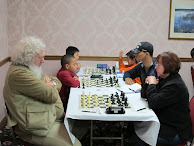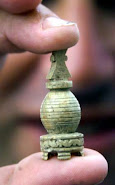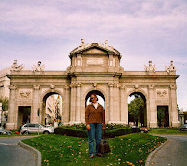 From the Huffingtonpost.com
Dan Agin
Author/Neuroscientist
Posted February 14, 2009 11:21 PM (EST)
Book Review: Tackling the Mystery of a 2,000-Year-Old Computer
The trouble with the history of ancient civilizations is that they've left us debris, and from the piles of bits and pieces we try to reconstruct who the people really were and how they lived.
The usual line about the ancient Greeks is that they were good talkers and philosophers and sculptors and sailors but miserable scientists and technologists. Except, of course, for Archimedes, who outclassed everyone of his time in science and engineering.
Most popular historical lines about antiquity sooner or later get revised. In 1901, halfway between Crete and the Greek mainland, Greek sponge divers discovered an ancient Greek sunken ship off the rocky island of Antikythera. From that ship came statues, pottery, glassware, jewelry, coins--and also a corroded lump of bronze later separated into three corroded pieces. The pieces lay around for most of the 20th century, until in the 1970s they were subjected to x-ray analysis that shocked archaeologists and historians alike. The pieces contained the remnants of an elaborate device, a system of 30 cogwheels laid on cogwheels, and after much study the consensus decision was that the Antikythera Mechanism, as it came to be called, was in fact an ancient analog computer.
Jo Marchant, a British science journalist, has given us a fascinating new book about this ancient Greek device (Decoding the Heavens: A 2,000-Year-Old Computer--And the Century-Long Search to Discover Its Secrets. Da Capo Press, 2009.) In ten chapters of clear prose she lays out the background, discovery, and analysis of the Antikythera Mechanism, an intriguing journey into science, archaeology, and history.
There are intellectual consequences of the existence of the Mechanism, and some of the consequences may require revisions of certain views of the history of antiquity. Technology and science can never really be separated, since one produces the other. Science produces new technology, and new technology produces new science, which in turn produces new technology, and so on, and so on. It's one reason why it's so difficult to predict the science or technology of the future. It's also one reason why when we look at the technology of the past, we need to ask about the science that had to exist to make that technology possible. The current view of the Antikythera Mechanism is that it was used to predict eclipses and to track the paths of the Sun and Moon through the zodiac--and maybe even to track the movements of the five planets known at that time. The current view is also that no device of such technological sophistication appeared again until a thousand years later. The question that confronts us is simple: Where are the records of the science that had to exist more than 2,000 years ago in order to produce the technology implied by the device? Was Archimedes involved? We don't know.
Jo Marchant's book is an intelligent account of what is apparently the world's first analog computer. The book and the story are well worth your time.
***************************
Who's to say the mechanism was of Greek manufacture? It could have come from Alexandria, India or China. The knowledge needed to construct the mechanism was probably lost during one of the times the Great Library at Alexandria was burned - or it may have been destroyed thousands of years before with the mysterious artifact surviving as an item of curiosity in some ruler's treasure house. Whenever barbarians take power, they attempt to destroy the knowledge base of those who came before - thus the destruction of libraries and book burning. The saying "knowledge is power" is more true today than ever before. It is the reason the Roman Catholic Church did not want people to learn to read and it was against the laws of several kingdoms to own the Scriptures! It is the reason the Mullahs insist that only they have the authority to interpret the Qoran. It is the reason repressive regimes around the globe attempt to control the internet and do control content in newspapers, magazines, television and radio.
From the Huffingtonpost.com
Dan Agin
Author/Neuroscientist
Posted February 14, 2009 11:21 PM (EST)
Book Review: Tackling the Mystery of a 2,000-Year-Old Computer
The trouble with the history of ancient civilizations is that they've left us debris, and from the piles of bits and pieces we try to reconstruct who the people really were and how they lived.
The usual line about the ancient Greeks is that they were good talkers and philosophers and sculptors and sailors but miserable scientists and technologists. Except, of course, for Archimedes, who outclassed everyone of his time in science and engineering.
Most popular historical lines about antiquity sooner or later get revised. In 1901, halfway between Crete and the Greek mainland, Greek sponge divers discovered an ancient Greek sunken ship off the rocky island of Antikythera. From that ship came statues, pottery, glassware, jewelry, coins--and also a corroded lump of bronze later separated into three corroded pieces. The pieces lay around for most of the 20th century, until in the 1970s they were subjected to x-ray analysis that shocked archaeologists and historians alike. The pieces contained the remnants of an elaborate device, a system of 30 cogwheels laid on cogwheels, and after much study the consensus decision was that the Antikythera Mechanism, as it came to be called, was in fact an ancient analog computer.
Jo Marchant, a British science journalist, has given us a fascinating new book about this ancient Greek device (Decoding the Heavens: A 2,000-Year-Old Computer--And the Century-Long Search to Discover Its Secrets. Da Capo Press, 2009.) In ten chapters of clear prose she lays out the background, discovery, and analysis of the Antikythera Mechanism, an intriguing journey into science, archaeology, and history.
There are intellectual consequences of the existence of the Mechanism, and some of the consequences may require revisions of certain views of the history of antiquity. Technology and science can never really be separated, since one produces the other. Science produces new technology, and new technology produces new science, which in turn produces new technology, and so on, and so on. It's one reason why it's so difficult to predict the science or technology of the future. It's also one reason why when we look at the technology of the past, we need to ask about the science that had to exist to make that technology possible. The current view of the Antikythera Mechanism is that it was used to predict eclipses and to track the paths of the Sun and Moon through the zodiac--and maybe even to track the movements of the five planets known at that time. The current view is also that no device of such technological sophistication appeared again until a thousand years later. The question that confronts us is simple: Where are the records of the science that had to exist more than 2,000 years ago in order to produce the technology implied by the device? Was Archimedes involved? We don't know.
Jo Marchant's book is an intelligent account of what is apparently the world's first analog computer. The book and the story are well worth your time.
***************************
Who's to say the mechanism was of Greek manufacture? It could have come from Alexandria, India or China. The knowledge needed to construct the mechanism was probably lost during one of the times the Great Library at Alexandria was burned - or it may have been destroyed thousands of years before with the mysterious artifact surviving as an item of curiosity in some ruler's treasure house. Whenever barbarians take power, they attempt to destroy the knowledge base of those who came before - thus the destruction of libraries and book burning. The saying "knowledge is power" is more true today than ever before. It is the reason the Roman Catholic Church did not want people to learn to read and it was against the laws of several kingdoms to own the Scriptures! It is the reason the Mullahs insist that only they have the authority to interpret the Qoran. It is the reason repressive regimes around the globe attempt to control the internet and do control content in newspapers, magazines, television and radio.
Sunday, February 15, 2009
New Book About the Antikythera Mechanism
 From the Huffingtonpost.com
Dan Agin
Author/Neuroscientist
Posted February 14, 2009 11:21 PM (EST)
Book Review: Tackling the Mystery of a 2,000-Year-Old Computer
The trouble with the history of ancient civilizations is that they've left us debris, and from the piles of bits and pieces we try to reconstruct who the people really were and how they lived.
The usual line about the ancient Greeks is that they were good talkers and philosophers and sculptors and sailors but miserable scientists and technologists. Except, of course, for Archimedes, who outclassed everyone of his time in science and engineering.
Most popular historical lines about antiquity sooner or later get revised. In 1901, halfway between Crete and the Greek mainland, Greek sponge divers discovered an ancient Greek sunken ship off the rocky island of Antikythera. From that ship came statues, pottery, glassware, jewelry, coins--and also a corroded lump of bronze later separated into three corroded pieces. The pieces lay around for most of the 20th century, until in the 1970s they were subjected to x-ray analysis that shocked archaeologists and historians alike. The pieces contained the remnants of an elaborate device, a system of 30 cogwheels laid on cogwheels, and after much study the consensus decision was that the Antikythera Mechanism, as it came to be called, was in fact an ancient analog computer.
Jo Marchant, a British science journalist, has given us a fascinating new book about this ancient Greek device (Decoding the Heavens: A 2,000-Year-Old Computer--And the Century-Long Search to Discover Its Secrets. Da Capo Press, 2009.) In ten chapters of clear prose she lays out the background, discovery, and analysis of the Antikythera Mechanism, an intriguing journey into science, archaeology, and history.
There are intellectual consequences of the existence of the Mechanism, and some of the consequences may require revisions of certain views of the history of antiquity. Technology and science can never really be separated, since one produces the other. Science produces new technology, and new technology produces new science, which in turn produces new technology, and so on, and so on. It's one reason why it's so difficult to predict the science or technology of the future. It's also one reason why when we look at the technology of the past, we need to ask about the science that had to exist to make that technology possible. The current view of the Antikythera Mechanism is that it was used to predict eclipses and to track the paths of the Sun and Moon through the zodiac--and maybe even to track the movements of the five planets known at that time. The current view is also that no device of such technological sophistication appeared again until a thousand years later. The question that confronts us is simple: Where are the records of the science that had to exist more than 2,000 years ago in order to produce the technology implied by the device? Was Archimedes involved? We don't know.
Jo Marchant's book is an intelligent account of what is apparently the world's first analog computer. The book and the story are well worth your time.
***************************
Who's to say the mechanism was of Greek manufacture? It could have come from Alexandria, India or China. The knowledge needed to construct the mechanism was probably lost during one of the times the Great Library at Alexandria was burned - or it may have been destroyed thousands of years before with the mysterious artifact surviving as an item of curiosity in some ruler's treasure house. Whenever barbarians take power, they attempt to destroy the knowledge base of those who came before - thus the destruction of libraries and book burning. The saying "knowledge is power" is more true today than ever before. It is the reason the Roman Catholic Church did not want people to learn to read and it was against the laws of several kingdoms to own the Scriptures! It is the reason the Mullahs insist that only they have the authority to interpret the Qoran. It is the reason repressive regimes around the globe attempt to control the internet and do control content in newspapers, magazines, television and radio.
From the Huffingtonpost.com
Dan Agin
Author/Neuroscientist
Posted February 14, 2009 11:21 PM (EST)
Book Review: Tackling the Mystery of a 2,000-Year-Old Computer
The trouble with the history of ancient civilizations is that they've left us debris, and from the piles of bits and pieces we try to reconstruct who the people really were and how they lived.
The usual line about the ancient Greeks is that they were good talkers and philosophers and sculptors and sailors but miserable scientists and technologists. Except, of course, for Archimedes, who outclassed everyone of his time in science and engineering.
Most popular historical lines about antiquity sooner or later get revised. In 1901, halfway between Crete and the Greek mainland, Greek sponge divers discovered an ancient Greek sunken ship off the rocky island of Antikythera. From that ship came statues, pottery, glassware, jewelry, coins--and also a corroded lump of bronze later separated into three corroded pieces. The pieces lay around for most of the 20th century, until in the 1970s they were subjected to x-ray analysis that shocked archaeologists and historians alike. The pieces contained the remnants of an elaborate device, a system of 30 cogwheels laid on cogwheels, and after much study the consensus decision was that the Antikythera Mechanism, as it came to be called, was in fact an ancient analog computer.
Jo Marchant, a British science journalist, has given us a fascinating new book about this ancient Greek device (Decoding the Heavens: A 2,000-Year-Old Computer--And the Century-Long Search to Discover Its Secrets. Da Capo Press, 2009.) In ten chapters of clear prose she lays out the background, discovery, and analysis of the Antikythera Mechanism, an intriguing journey into science, archaeology, and history.
There are intellectual consequences of the existence of the Mechanism, and some of the consequences may require revisions of certain views of the history of antiquity. Technology and science can never really be separated, since one produces the other. Science produces new technology, and new technology produces new science, which in turn produces new technology, and so on, and so on. It's one reason why it's so difficult to predict the science or technology of the future. It's also one reason why when we look at the technology of the past, we need to ask about the science that had to exist to make that technology possible. The current view of the Antikythera Mechanism is that it was used to predict eclipses and to track the paths of the Sun and Moon through the zodiac--and maybe even to track the movements of the five planets known at that time. The current view is also that no device of such technological sophistication appeared again until a thousand years later. The question that confronts us is simple: Where are the records of the science that had to exist more than 2,000 years ago in order to produce the technology implied by the device? Was Archimedes involved? We don't know.
Jo Marchant's book is an intelligent account of what is apparently the world's first analog computer. The book and the story are well worth your time.
***************************
Who's to say the mechanism was of Greek manufacture? It could have come from Alexandria, India or China. The knowledge needed to construct the mechanism was probably lost during one of the times the Great Library at Alexandria was burned - or it may have been destroyed thousands of years before with the mysterious artifact surviving as an item of curiosity in some ruler's treasure house. Whenever barbarians take power, they attempt to destroy the knowledge base of those who came before - thus the destruction of libraries and book burning. The saying "knowledge is power" is more true today than ever before. It is the reason the Roman Catholic Church did not want people to learn to read and it was against the laws of several kingdoms to own the Scriptures! It is the reason the Mullahs insist that only they have the authority to interpret the Qoran. It is the reason repressive regimes around the globe attempt to control the internet and do control content in newspapers, magazines, television and radio.
Subscribe to:
Post Comments (Atom)



































No comments:
Post a Comment